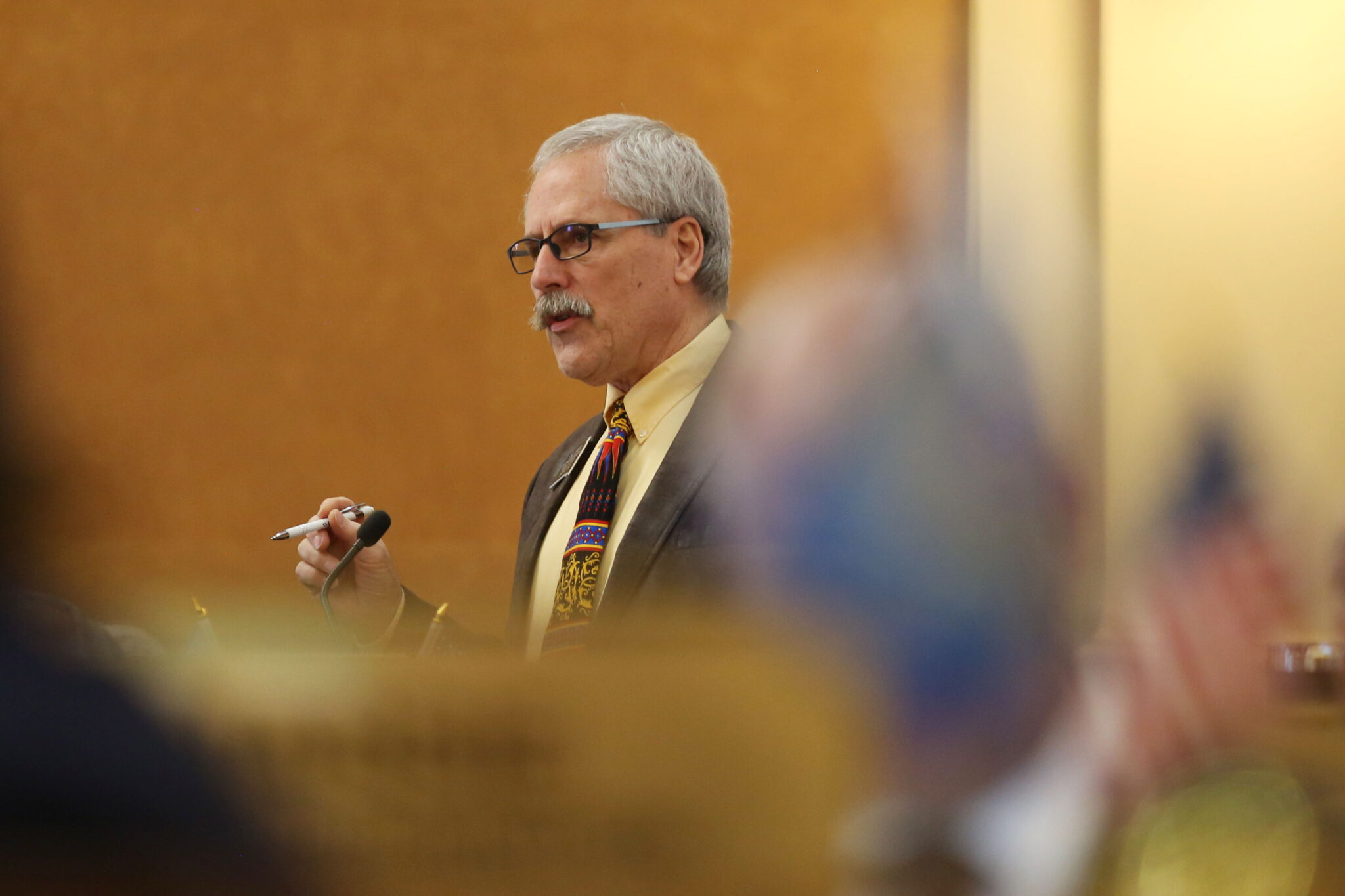
Joshua Haiar/South Dakota Searchlight
The Republican Party divide that was evident in Tuesday’s primary election continued to play out Thursday and Friday as rival factions clashed during the state party convention, with more turmoil expected Saturday.
Fourteen Republican legislators lost their primary races Tuesday to fellow Republicans. Two days later, party delegates from around South Dakota gathered in Pierre.
“There is a lot of frustration from the grassroots people who have come to partake in the convention,” said Rep. Karla Lems, R-Canton, who won her primary.
She said some of those people feel party officials are attempting to sideline the everyday Republicans who make up the base of the party.
“That is the heartbeat of the Republicans of the state of South Dakota,” Lems said.
Property rights debate
She described the divide as “the corporatists” who currently run the state versus “the constitutionalists” who gained ground during Tuesday’s election.
A major factor in the primary was a division over the proposed multi-billion-dollar Summit Carbon Solutions pipeline. It would cross farms, ranches and other private property to transport carbon dioxide captured from Midwest ethanol plants to North Dakota for underground storage. Summit wants to capitalize on federal tax incentives to keep heat-trapping carbon out of the atmosphere.
Lems and others in her faction have pushed to prevent the project from using the legal right of eminent domain to cross private property. Others in the party — including some of the incumbents who lost Tuesday — helped pass a bill during the last legislative session that implements new protections for landowners but also preserves a path forward for the project.
“That is why they went down, and that is why they will continue to lose,” Lems said.
Pat Powers, a Republican who is at the convention and writes the Dakota War College political blog, sees it differently.
“They believe themselves to be the base, but they don’t take into account the other 80% of registered Republicans,” Powers said. “They are by no means reflective of the views of South Dakota Republicans as a whole.”
He said the allegation that some people at the convention are being sidelined is “silliness.”
“If they have the votes, they can do what they want,” Powers said.
Races for party nominations, positions
The rift has been underscored during the convention by a newly announced challenge to incumbent Public Utilities Commissioner Kristie Fiegen, from Amber Christenson of Rapid City. The PUC position is the only nomination for a public office up for grabs at the convention this year. The person chosen by convention delegates as the party’s nominee will run in the Nov. 5 general election. The PUC denied Summit a project permit last year, but the company has said it plans to reapply.
There are other races at the convention for party positions. Rep. Phil Jensen, of Rapid City, is challenging Watertown Mayor and former legislator Ried Holien for the position of national committeeman.
Jensen said party members want and deserve more deeply conservative leadership.
“I want to be a voice for the grassroots,” Jensen said. “These county parties have gotten organized so that they can be represented.”
Powers said the national committeeman represents the state party at the national level — voting at the national party convention, coordinating with state officials and assisting in fundraising and campaigns.
After learning Jensen announced his bid for national committeeman, Powers published commentary on his Dakota War College blog calling on fellow Republicans to ask themselves “what image we want to represent.”
“Because Phil Jensen might be the worst role model to represent South Dakota Republicans,” Powers wrote.
Powers cited numerous controversial statements and positions taken by Jensen, including 2011 legislation from Jensen that unsuccessfully sought to expand the definition of justifiable homicide to include killings intended to protect a fetus from an abortion.
Powers also cited 2016 comments by Jensen about a tip Jensen said he received regarding “dozens of South Americans” fleeing a bus parked in Rapid City. Jensen said at the time that the tip was substantiated by a witness who “knew they were South Americans because they had different skull structures and skin tones from Mexicans.”
Powers wrote that sending Jensen to the national convention would reflect poorly on the state party: “If the South Dakota Republican Party wants to portray to the rest of the nation that we are a bunch of backwater redneck crazy uncles who might be racists, then he might be a good selection.”
Jensen said convention delegates are also debating language used in GOP materials.
“In the rules committee yesterday morning, they about had a riot in there,” Jensen said, “And we had one of the guys on the platform committee try to get rid of the phrase ‘our Judeo-Christian heritage’ because it would offend the Muslims in the state.”
Lems said one committee tried to stop attendees from including language that describes the use of eminent domain by private industry for profit as “fascism,” calling that language “too divisive.”
“We have to start saying the truth, speaking the truth,” Lems said.
State Party Chairman John Wiik did not immediately reply to a request for comment. Several other Republicans, including legislators and current or former party officials, declined to comment or did not return messages.
